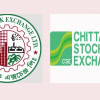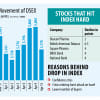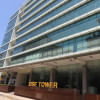Retail investors' holdings in stocks fall by half in 12 years

Retail investors' stakes in the share market of Bangladesh have nearly halved in the last 12 years as they are increasingly losing their appetite for stocks owing to a lacklustre market performance.
In January 2011, general investors' combined shareholding was 37.86 percent of the total shares of the companies listed on the Dhaka Stock Exchange (DSE). It has now dropped to 20 percent, figures from the premier bourse of the country showed.
Attracted by the debut of the country's largest mobile phone operator Grameenphone, Torikul Islam, a public sector employee, invested Tk 8 lakh in the stock market by selling gold ornaments of his wife in 2009.
The value of his shares surged to Tk 32 lakh within the span of a year. He was expecting the bull run to continue as the economy was also performing well, so he did not sell the shares.
But by the end of 2010, the value started to dip as the market crashed. The share value plummeted to Tk 2 lakh by 2014, leaving him gutted and he sold them off and has never returned to the market.
Many investors, who had been hit by the same misfortune, also followed the same path.
The worst-hit were investors who had taken margin loans from brokerage firms and merchant banks to expand their portfolio. At the end of the day, they went home empty-handed.
Market intermediaries were not spared either since many did not get back the funds they lent to the cash-strapped beneficiary owner (BO) account-holders in their heydays through margin loans, a form of credit investors secured by keeping their securities as collateral.
Md Belal Hossain, a stock investor who closed two BO accounts in 2021, said the investment in the stock market gave him nothing but tension.
He mainly parked funds in well-performing companies but he too saw a lower return compared to the national savings certificate rate. Likewise, the profit from initial public offerings (IPOs) was lower.
"Therefore, I left the market and kept the funds in the national savings schemes," he added.
Many retail investors were attracted by the bull run in 2010 and the prices were lucrative to sponsors, which prompted them to offload more shares while general investors bought shares without assessing the risks.
This lifted the stake of the general investors in the market, recalled Md Moniruzzaman, managing director of Prime Bank Securities.
"When the market crashed and general investors saw a massive erosion in the value of their holdings, they began to dump shares and their dominance ended," he said.
The DGEN, the previous broad index of the DSE, almost doubled within a year to 8,918 points. But it halved to 4,100 in 2013.
The debacle led the government to reform the market. Accordingly, the premier bourse introduced a new broad index named DSEX.
It rose by around 50 percent to the 6,500 level in 2018 before slipping below 4,500 in 2020. It hovered around 6,300 for one and a half years due to the introduction of the floor price in 2022 and uncertainties brought on by the lingering fallout of the coronavirus pandemic and the macroeconomic crisis stemming from the Russia-Ukraine war and internal failures.
The number of BO account-holders also declined.
In 2010-2011, some 10.31 lakh new BO accounts were opened, taking the tally to 27.63 lakh at the end of the financial year, according to the annual report of the Bangladesh Securities and Exchange Commission (BSEC).
As of January 28 this year, there were 17.78 lakh BO accounts. Of them, 3.07 lakh accounts had no share at all, figures from the Central Depository Bangladesh Ltd showed.
Ali Imam, managing director of Edge Asset Management, said many retail investors left the market as the equity investment is providing a low return while savings certificates offer a handsome yield.
"People still prefer banks to keep their funds. They also like to invest in the real estate sector. These investors don't go to asset managers."
A major portion of the mutual funds comes from corporates as well.
Many institutional investors also do not have the capacity to invest as they are struggling with a huge negative equity. Some institutional investors have the ability to invest but are reluctant to do so amid a lower number of well-performing companies.
In the last 10 years, only two large companies — Walton and Robi — went public and these are sound firms. But the number of their shares publicly available for trading is limited, Imam said.
Although retail investors' stakes fell, the ownership of sponsors and directors rose to 58 percent from 42 percent, DSE data showed. This jump mainly came after the BSEC became strict about the holding of minimum shareholding by sponsors and directors.
According to the securities order issued in 2012, directors must hold at least 2 percent of shares individually and 30 percent jointly to keep their positions.
At present, institutional investors hold a 15 percent stake in the listed companies, the government owns 4 percent, and foreign investors hold 3 percent.
In 2011, institutional investors' holding was 14 percent, the government's 4.78 percent, and foreign investors' 1.36 percent.

 For all latest news, follow The Daily Star's Google News channel.
For all latest news, follow The Daily Star's Google News channel. 








Comments